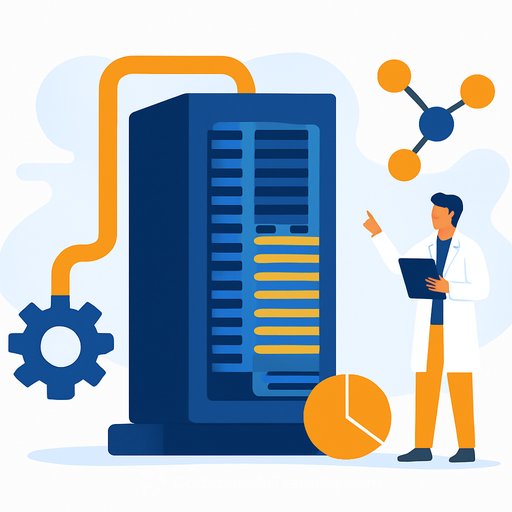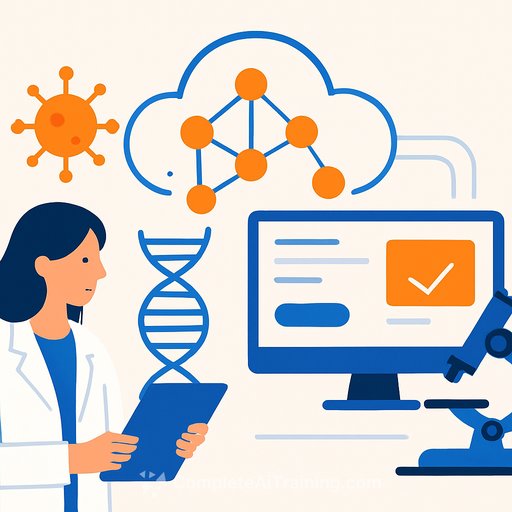Merck KGaA, Darmstadt, Germany Launches High-Performance Supercomputer with Equinix and Lenovo to Accelerate AI and Scientific Research
Merck KGaA, Darmstadt, Germany has deployed a new high-performance computing platform built on Lenovo ThinkSystem servers and hosted in an Equinix AI-ready data center in Germany. The system blends private and public cloud infrastructure to give R&D teams flexible scale for compute-heavy workloads.
The focus is clear: speed up discovery in life science, compress timelines in drug development, and advance materials research for next-generation semiconductor technologies-all on a unified digital foundation.
Why this matters for science and research
- Life science: Faster screening and simulation for product development and manufacturing workflows.
- Healthcare: Shorter feedback loops for target identification, virtual screening, and model-based trial design.
- Electronics: Quicker iteration in materials modeling and process optimization for chip-related applications.
One platform across three sectors reduces duplication and encourages shared methods, data practices, and tools. That keeps teams aligned while scaling experiments.
What's under the hood
- Hybrid architecture: Private and public cloud resources combined for burst capacity and cost control.
- Lenovo ThinkSystem + liquid cooling: High-density compute with Neptune liquid cooling to improve thermal efficiency and energy use.
- Equinix data center fabric: High-performance interconnection, data locality options, and support for data sovereignty across regions.
- Scale with efficiency: Equinix offers liquid cooling in 100+ IBX data centers across 45+ metros, helping meet growing compute needs while tracking toward ESG goals.
Voices from the initiative
"Data and technology are the cornerstones of scientific progress," said Laura Matz, Chief Science and Technology Officer at Merck KGaA, Darmstadt, Germany. "This platform helps our teams use AI and advanced analytics more effectively."
Lenovo's Andreas Thomasch added that the system shows high performance can go hand-in-hand with efficiency, citing the role of liquid cooling for demanding workloads. Equinix's Harmeen Mehta highlighted the practical value of pairing digital infrastructure with compute to move complex research forward responsibly.
How labs and research teams can benefit now
- Containerize and schedule: Package workloads (e.g., Apptainer/Singularity) and use job schedulers to move cleanly between on-prem, private cloud, and burst capacity.
- Unify data flows: Standardize on object storage plus a parallel file system tier. Build clear data governance rules for sensitive data and cross-border collaboration.
- Combine HPC + AI: Pair simulation with ML for surrogate modeling, uncertainty quantification, and active learning to cut iteration cycles.
- Track reproducibility: Use experiment tracking, registries, and versioned datasets to keep results auditable across teams and clouds.
- Measure sustainability: Instrument jobs with energy metrics and adopt cooling-aware scheduling to meet operational and ESG targets.
The bigger picture
This collaboration shows how specialized infrastructure, efficient cooling, and smart interconnection can remove bottlenecks in data-heavy science. The net effect is faster experiments, more reliable pipelines, and a clearer path from idea to validated result.
About the partners
Merck KGaA, Darmstadt, Germany: A science and technology company operating across life science, healthcare, and electronics, with more than 62,000 employees worldwide.
Lenovo: Global technology provider with a portfolio spanning devices, infrastructure, and AI-ready solutions, including liquid-cooled HPC systems.
Equinix: Digital infrastructure company providing AI-ready data centers and globally interconnected ecosystems to support secure training, inference, and data exchange.
Resources
Your membership also unlocks:






